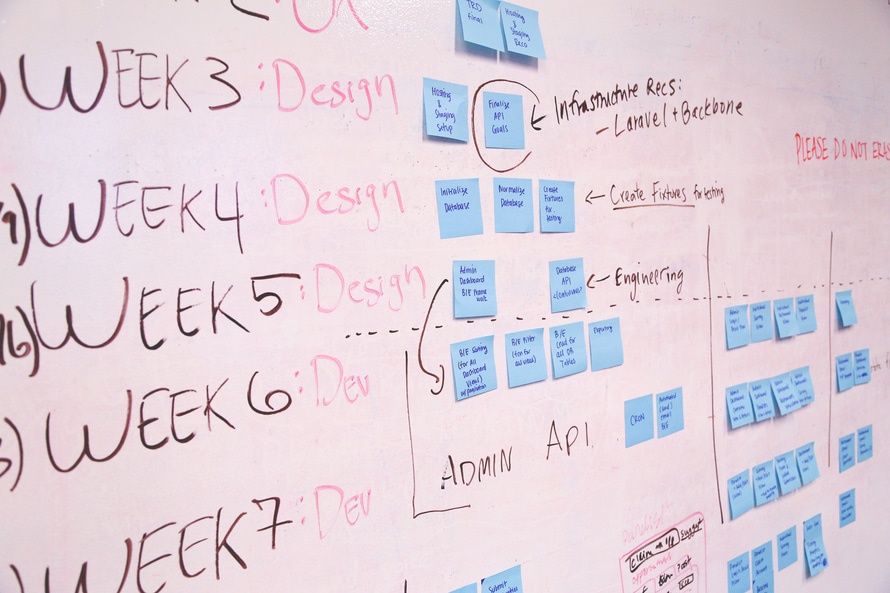If you want a new career as a web developer, it involves more than just hard tech skills like knowing how to code, understanding algorithms, and having the know-how to debug programs.
There are certain universal soft skills that are desirable in almost every industry—technology included. You’ll need to demonstrate these non-technical skills in your interviews and other interactions to show you’re the kind of person someone would want to hire.
Since working in tech doesn’t mean being a solitary “code monkey” in a cubicle all day anymore, you’ll need to make sure your programmer soft skills are as up to par as your coding skills themselves.
Below guest writer William Kennedy shares 10 non-technical skills that have helped him be a better software developer. These are software engineer soft skills that don’t involve coding, but will make you a more proficient developer as well as teammate.
Take it away, William!
Disclosure: I’m a proud affiliate for some of the resources mentioned in this article. If you buy a product through my links on this page, I may get a small commission for referring you. Thanks!
Join the free portfolio course
Sign up below for my *free* course on how to build a portfolio site as a web developer/designer.
Becoming a software developer involves more than just writing code. I learned this quickly since starting my first job as a software developer. There is a “particular set of skills” (to quote Liam Neeson from Taken) you need to thrive.
See, there is a bigger picture at every company. Aside from writing code, you need to leverage other skills to make an impact and to earn more money: software developer soft skills.
Throughout my tenure as a developer, I learned what software engineer soft skills are required—aside from hard skills like programming. Below I share 10 surprising programmer soft skills you could benefit from having as an aspiring developer.
What Are Soft Skills?
Soft skills are non-technical skills that help you perform a job and succeed in the workplace. So instead of hard skills like Python, SQL, or data structures, web developer soft skills can include things like communication, teamwork, work ethic, critical thinking, and organization.
Soft skills involve personality traits and attitudes, and often come from life experiences, but most (if not all) can actually be learned and improved. Soft skills vs. hard skills are undeniably different, but something they have in common is that they both take practice!
☝️ Back to top
Why Are Soft Skills Important?
Soft skills are important because they are what make you a good employee. Even if you have all the right hard skills for a job, you may not get hired if you don’t have the right soft skills to connect with your interviewer.
Additionally, with great soft skills, web developers are better equipped to use their hard skills to the fullest extent. Programmer soft skills affect how well you work with others on the tech team and across teams, which can have a positive influence on your career development.

If you are (or want to be) a freelance developer, web developer soft skills can also help you keep clients. For instance, if you have excellent communication skills, clients will likely want to hire you or continue working with you.
Maybe you’re really good at some software engineer soft skills, but I expect there are gaps/areas you could improve on. Now is the time to work on them, so when you’re ready to apply for jobs/freelance/go to the interview, you 1) have them and 2) have evidence of them.
☝️ Back to top
10 Top Software Developer Soft Skills
One way to see which soft skills you need to develop and work on is to go and look at the requirements on job listings to see what soft skills are included most often.
Or, you can let me do that for you! Here are 10 of the most common soft skills needed for a job in software development.
Programmer Soft Skill #1: Written and Verbal Communication 💬
Before work each day, you’ll probably have emails to get to. Emails can quickly become a productivity death trap. At the same time, emails can be a gateway to demonstrating how valuable you are to other people. Writing still leads the way as the de facto in business communication.
Since written communication is so important, I have spent a lot of time mastering the art of sending an email that can get a response quickly.

All my emails are designed to be friendly, but also get to the point as soon as possible. Here is my 4-step process to get the most out of emails that are asking for a technical requirement:
- Always thank the person for emailing you. This applies to every email. E.g., Thanks for contacting me.
- Emphasize the point they made and show that you understand them. E.g, “If I am reading you correctly, you wish to…”
- Ask questions to make sure you understand what they want.
- After they answer your questions, reply back the same way you did in step 2 just to confirm that you have an understanding.
These steps will save you massive time up front and distinguish you from others who will not go the extra mile. Written communication is one of the most underrated soft skills web developers can have in their arsenal. Expressing your ideas clearly in writing takes many years of practice but the results are intangible.
Effective verbal communication skills are also important so you can explain your work/any issues to the UX designers, product managers, marketing team, etc. Maybe you need to present your work to non-technical people within your company in a way they can easily grasp without jargon.
If you freelance, you need to be very clear about what is and isn’t included in your web design proposal or you’ll end up doing more work than planned/the client will be unhappy.
➡️ How to learn communication soft skills:
- Start a blog or podcast
- Contribute to open source projects
- Take a technical writing course, e.g. Technical Writing Process for Beginners on Skillshare
- Take a communication skills course like Communications: How to Talk, Write, Present, and Get Ahead! on Pluralsight (specifically designed for people in the tech industry)
☝️ Back to top
Programmer Soft Skill #2: Teaching 👨🏫
If you are a beginner in the tech industry, then you probably think you have nothing to teach. The reality is that you probably do.
When I started my first web development job, I thought I would spend more time learning from others. This was not the case at all. In fact, I was doing a combination of both learning and teaching. Our company had decided to move from SVN to Git. I actually got the job because my main portfolio was just lots of Github repos.
When I joined, it was a growing team and there was pressure for us to move to Git as it was a better tool for collaboration.
It was quite a surreal experience, because, for the first time in my life, I had to equip myself with a marker and draw diagrams on a whiteboard. They were simple diagrams demonstrating how git worked and how it interacted with Github. They also explained how to make the best use of branching.

Keep in mind: this was after being at the company for only a month. Since then, I have been part of brainstorming sessions and explained how everything in Rails works, from sessions to nested forms.
In your first development job, you may end up teaching others about a topic you are more knowledgeable about than they are. Even if you don’t consider yourself an “expert” or “advanced”.
Furthermore, “teaching” can come in many forms. Even as a freelancer, you might be in the position of explaining a concept to a client or justifying a particular decision by teaching them information about your process.
In every company, there is a shared knowledge pool. I contribute to it when I teach, but I also take away lessons and insights from others.
Basically, everyone contributes their experience and perspective to this pool. And a huge aspect of this synergy is teaching.
➡️ How to learn teaching soft skills:
- Teach a friend or family member something — can be anything (knitting, how to play a certain video game, how to draw something, how to drive stick shift, etc.)
- Create your own online course. Teachable lets you create your own online course on anything you’re passionate about. You can even earn money by selling your online courses! Remember, you don’t have to be an “expert” to teach someone something.
- Take up a tutoring job or volunteer in a classroom or after school club.
- Do talks at freecodecamp events or other coding-related events.
Programmer Soft Skill #3: Focus and Productivity ⏰
In any career, whether it be a painter or a writer, an individual’s focus on the small details can accumulate to greatness. If you want to produce amazing work, you need to be alert and fine-tuned.
If your attention to detail is not up to snuff, then it is important that you address your ability to focus.

The ability to focus wholly on one task is a diminishing quality in our current world. Twitter, Facebook, TikTok and Reddit are constantly trying to lure us away from doing meaningful work. In his book titled “Deep Work” (found on Amazon), Cal Newport states that in order to have an impactful career, one must be willing to discard shallow work and embrace deep work.
Shallow work is defined as work that only has a short-term benefit. For example, you could spend your day writing and replying to emails but would miss out on deep work. Deep work is the work that needs total concentration and ultimately leads to tangible results.
As a developer, this skill cannot be understated. Our job is to build useful stuff. And to create something that is valuable to others can take a lot of time. It takes less of a consumer mindset and more of a producer mindset. It doesn’t matter if you’re tired or under pressure; if it’s your job, you need to be able to produce quality work regardless.
One technique you may find useful is the Pomodoro technique. There are loads of cool versions available online.
Here is how it works:
- You set a timer for 25 minutes
- You concentrate on ONE task for that 25 minutes
- After the 25 minutes are up, you take a 5-minute break
- Any thoughts that come to your head that are not related to the task at hand, you write them down to focus on later.
- You repeat the cycle up to four times (or even more)
This technique is great because it makes you focus on one thing at a time. Which helps you produce more meaningful work—rather than checking Twitter or Facebook every several minutes.
➡️ How to learn productivity soft skills:
- Take a course like Modern Productivity — Superhuman Focus In A Distracted World (develop a productive mindset and stay motivated) or Improving Your Focus on LinkedIn Learning, taught by productivity expert and best-selling author Dave Crenshaw.
- Do the #100DaysOfCode challenge where you code a minimum of an hour every day for the next 100 days and tweet your progress.
Start coding now
Stop waiting and start learning! Get my 10 tips on teaching yourself how to code.
☝️ Back to top
Programmer Soft Skill #4: Understanding the Bigger Picture 🖼️
A developer who works at a company whose main product revolves around code has a careful balancing act to perform. On one hand, things need to ship out to production to help the business to grow. On the other hand, you have to ensure your future colleagues are not left with unmaintainable code. And, of course, the user also has to enjoy the software.
However, at first, you can only write code to the best of your abilities at the moment. But when you start to improve as a developer—which you will—you’ll want to go back and refactor that original code. Make your software better to benefit the future developers that will have to work with it.

A great concept is the DRY (don’t repeat yourself) principle. The underlying idea is to write a piece of code that only has to be changed once if you decide to alter it in the future. This approach is for both programmer happiness and business benefit.
Yet the software developer soft skill of understanding the bigger picture does not just relate to code. Most big companies follow the principles of Peter Drucker. If you studied an MBA, you might have heard of Peter and his management principles. If not, his books are available on Amazon.
Peter had a profound impact on Western companies. From him, one of the most important concepts is the cost center and profit center. People who work in sales and marketing are considered to be in the profit center of the business. They drive revenue. In a business costs must always be controlled to maximize revenue. As a developer, you can either be in the profit center or the cost center.
The best way to manage your career is to have perspective and understand where you fit inside the business. This allows you to add more value and take your career further.
➡️ How to learn big-picture thinking:
- Take a course like Strategic Thinking on LinkedIn Learning, which gives you tools to help you think on a big and small scale, long and short term.
- Read a book like Swipe to Unlock (via Amazon), which teaches you the must-know concepts of technology and business strategy
- Learn tech-adjacent/business skills like digital marketing, SEO, design, etc.
- Listen to industry podcasts/read newsletters like Tech News Briefing (daily 10-minute podcast on tech trends), Techmeme Ride Home (15 mins on the day’s important tech news and topics), and TLDR (daily newsletter with links and TLDRs of the most interesting stories in tech, science, and coding)
Programmer Soft Skill #5: Social Skills 🗣️
Many people believe that companies such as Google create a culture from the top down. However, there is also a culture established by you and your peers at the company. And the best way to cultivate this team-wide culture is through your own social skills.
Think back to your real life, not work life, for a moment. Do you have that one friend in your posse that everyone looks forward to seeing? Their presence alone can bring laughter and thoughtful discussion to a room. They don’t spread gossip or rumors. They offer a hand whenever someone is in need. Overall, they can only be described as a stand-up guy or gal.

That kind of person also exists in the workplace. And your goal should be to try to be that person.
Be the person that everyone looks forward to seeing. Build up the courage to voice your opinion in a constructive manner. It does not matter whether you consider yourself to be an introvert or an extrovert.
Later on in your career, your technical skills will be the same as everybody else in your field. But if you want to get ahead in the workplace, you need to be a team player. You must be able to communicate, inspire others, and be trustworthy. Because at the end of the day if you can’t connect with someone, then you will never be able to sell your idea—no matter how big or small it may be. And you’ll end up taking orders instead of giving them out.
Having great social skills can also help you develop confidence and overcome imposter syndrome.
➡️ How to improve social skills
- Take a soft skills training course like Develop Amazing Social Skills & Connect With People on Udemy or Emotional and Social Intelligence by UC Davis via Coursera (a course specific to the workplace)
- Join a class or club you’re interested in — outside of work. This can be anything. Yoga class. Book clubs. Local meetups. Use them as a chance to develop your social skills and meet new people
- Go to hackathons or tech meetups
☝️ Back to top
Programmer Soft Skill #6: Troubleshooting Problems 💻
One of the best parts about being a programmer is solving problems. But before you actually solve a problem, you must first go on a journey of finding out what that problem is exactly.

The easiest thing in the world is to memorize a bunch of commands or copy and paste code found on Stackoverflow. Yet the real power is knowing the bigger picture of what’s going on. If you are tackling a big problem at work, it is best to break it down into tiny editable pieces.
Start by looking at the problem itself. Think about the problem the code is trying to address.
- Does it help users navigate a website more easily?
- Does it do reporting?
- What was this software created for?
Then, look at the current solution (if one exists). Lastly, consider how the current solution is solving the problem. (If it is at all.)
Once you get a high-level overview of the application, you can go into features of the application. Use the problem, solution, and details technique to further break down the issue. This framework has helped me to understand different open-source projects such as Discourse.
➡️ How to learn troubleshooting skills:
- You can try taking a course. Troubleshooting and Debugging Techniques on Coursera is a good one to start off with, as you’ll learn strategies for approaching almost any technical problem.
- Taking part in hackathons and open source projects, and creating your own projects, etc. By doing hands-on projects, you’ll run into real-world issues and be able to practice your troubleshooting process.
Programmer Soft Skill #7: Teamwork 🤝
Teamwork has tie-ins with social skills and communication, but it’s also its own unique programmer soft skill. Teamwork is important so you can effectively collaborate with other team members, e.g. the frontend devs if you work on the backend.
As a developer, you’ll also interact and work with a wide variety of teams and people — UX designers, product managers, engineering managers, others devs, even customers/clients. It’s rarely a solo job, even if the coding work is independent. Teamwork is also important for completing development projects on time and within budget.

Many development teams also do daily “stand-ups,” which are short meetings where you go over what you’ve been working on with other team members. You may also participate in pair programming, where you work with another dev to code together on one computer.
➡️ How to learn it
- Go to hackathons
- Take a course like Working on a Team on Pluralsight, which covers the dynamics of a team, why teams fail or succeed, leadership issues, tactics to help you become a better team contributor, and ideas for working with difficult people
☝️ Back to top
Soft Skill #8: Problem-solving 🤔
What’s the difference between problem-solving and troubleshooting, you may ask? Troubleshooting is more about identifying problems, but actually solving them relies on a different set of soft skills. In order to deal with problems, you need to know how to approach them and have strategies for coming up with solutions.
➡️ How to learn problem-solving soft skills:
- Take a course like Problem Solving Using Computational Thinking — learn how to take complex problems, understand what the issue is, and develop solutions.
- In your free time, play games that train the problem-solving side of your brain — like Sudoku, crossword puzzles, improv, even escape rooms!
- Read the book Think Like a Programmer: An Introduction to Creative Problem Solving (via Amazon) which teaches how programmers solve problems.
Programmer Soft Skill #9: Patience and Persistence ⏳
When your code isn’t working and you can’t figure it out, you need to be able to keep calm and dig through to find the error. Or when a code review is taking a long time, customers are giving you tons of feedback, and/or you need to learn something new to complete a project, patience and persistence will be important.
➡️ How to learn patience soft skills:
- Combine this with your “teaching” soft skills training! You have to be patient to teach difficult concepts to another person, so take up a side gig and tutor students in math or another subject you’re good at
- Take a course like Build Personal Resilience on Coursera (strategies for self-management, handling stress, motivation and organization) and
- Read 5 Personality Traits Every New Programmer Should Have
Programmer Soft Skill #10: Passion ❤️
This can be the web developer soft skill that gets you a foot in the door. What interests do you have that you could capitalize on?
For example, if you’re into yoga, could you build a side project in that area? You could make a directory of yoga teachers, a blog about yoga, or a workout app. Then, if you apply for jobs for companies in the fitness industry, you’ll be a step ahead of anyone without that passion and the experience to back it up.

➡️ How to find your passion
- Take a course like Unlock your passion to live a fulfilling and content life on Udemy (identify what you’re passionate about and master it) or Find Your Fit by Break Into Tech (a course designed to help you find the perfect tech role for you)
- Try a whole bunch of different hobbies and see what you love! Sometimes you don’t know you enjoy something until you just give it a shot.
☝️ Back to top
Using Your Soft Skills in the Workplace
Certain job skills are universal, whether you’re in a tech position or not. For instance, communication and teamwork are vital in any role where you’re working with other people (which is most of them!). I wish I realized the importance of these soft skills before I landed my first job as a web developer. If you can focus on honing your non-technical skills while you’re learning to code, you’ll be a step ahead from the start!
💡 More things you can do to be ready: 5 Things You Can Do to Get Hired in Tech.
William is a self-taught software developer who went from a job he hates to a job he now loves. As well as writing about himself in the 3rd person, he breaks down exactly what you need to do if you want to get your first job as a software developer on his blog and newsletter.
Note: there are affiliate links in this post.
Note: This article contains Amazon affiliate links. As an Amazon Associate, I earn from qualifying purchases.


